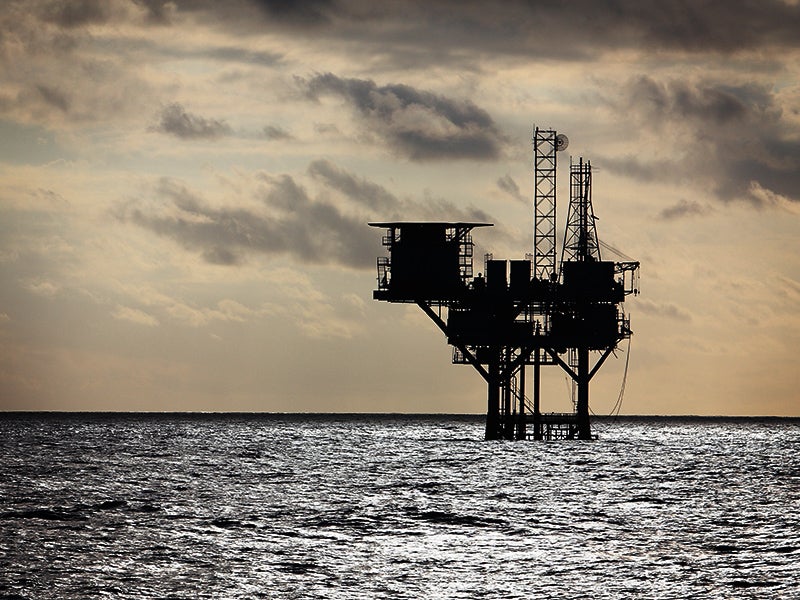The Tide is Turning Against Offshore Drilling
A week that saw oil companies retreat from the Arctic’s Chukchi Sea, an agreement among Arctic-bordering countries, and a large spill could be the beginning of the end for offshore drilling.

This page was published 9 years ago. Find the latest on Earthjustice’s work.
Last week, more than 88,000 gallons of oil leaked from a ruptured pipeline at one of Shell’s offshore oil fields, creating a 13-mile slick in the Gulf of Mexico that resembled a deep purple bruise. The incident was a painful reminder of the risks of offshore drilling, and it happened during a week that saw a rising tide of progress away from the destructive practice.
On May 10, Shell and most of the other major oil companies announced that they have relinquished nearly all their leases in the Chukchi Sea in the Arctic Ocean. The companies’ decisions to give up more than 350 leases follow Shell’s announcement last fall that, after a failed $7 billion campaign, the company would abandon Arctic Ocean oil exploration “for the foreseeable future.” This is good news for the Arctic Ocean, where the Department of the Interior itself predicts a 75 percent chance of a large oil spill if even just the Chukchi Sea were developed, and where there is widespread consensus that an oil spill could not be effectively cleaned or contained.
Three days after the news of the oil industry’s latest retreat from the Arctic, the leaders of the United States, Canada, Denmark, Finland, Iceland, Norway and Sweden held a summit to work out terms for collaboration on commitments regarding climate change and the Arctic. The U.S.-Nordic Leader Summit reiterated that any commercial activities in the Arctic must be consistent with national and international goals to limit climate change.
While the specifics have yet to be hammered out, the agreement echoes an earlier meeting between President Obama with Canadian Prime Minster Trudeau. There, the two leaders signaled that climate change consequences will be central to commercial management decisions in the fragile Arctic region.
These milestones for the Arctic occurred during a week where more than a thousand citizens, including Arctic community leaders, marched on Washington, D.C., demanding President Obama stop all new offshore drilling in the Arctic, Atlantic and the Gulf of Mexico.
While the most recent retreat of the oil industry should help turn the tide for the future of the Arctic, Shell and other companies still retain some leases in the Chukchi and neighboring Beaufort Sea. Shell is still fighting to extend the terms of its leases, showing that it wants to keep the door open for Arctic Ocean drilling. But the case against Arctic drilling is clear: The Arctic remains one of the most vulnerable places on earth to climate change, warming at twice the rate of the rest of the world, putting tremendous strain on its diverse wildlife and people. Science tells us we already cannot burn more than a fraction of the proven oil reserves we know about if we are to avoid the worst effects of climate change, let alone add unproven reserves like those in the Arctic Ocean to the fire.
There is currently no offshore oil and gas development in America’s Arctic Ocean, nor in the Atlantic. Oil production in these oceans—if feasible at all—would take decades to come online and would require massive new infrastructure, locking in production for decades to come. Meanwhile, our country is already transitioning away from its reliance on fossil fuels and needs to accelerate, not complicate, the transition. If we are to avoid the worst impacts of climate change, there should never be oil development in these oceans. And in the Gulf, we need to begin a just transition toward a sustainable future for the region away from oil and gas activity.
President Obama now has the opportunity to extend his climate legacy. The Obama administration should omit Arctic and Gulf lease sales from its final five-year plan. And in keeping with his leadership in combating climate change, President Obama should use his separate authority to ensure both the Arctic and Atlantic oceans, still untouched by oil development, never again face the threat of oil drilling in any future plan.
See our fact sheet: “Five Reasons to Withdraw the U.S. Arctic and Atlantic Oceans from All Future Leasing.”
Take Action: Tell President Obama No New Offshore Drilling.
Opened in 1978, our Alaska regional office works to safeguard public lands, waters, and wildlife from destructive oil and gas drilling, mining, and logging, and to protect the region's marine and coastal ecosystems.